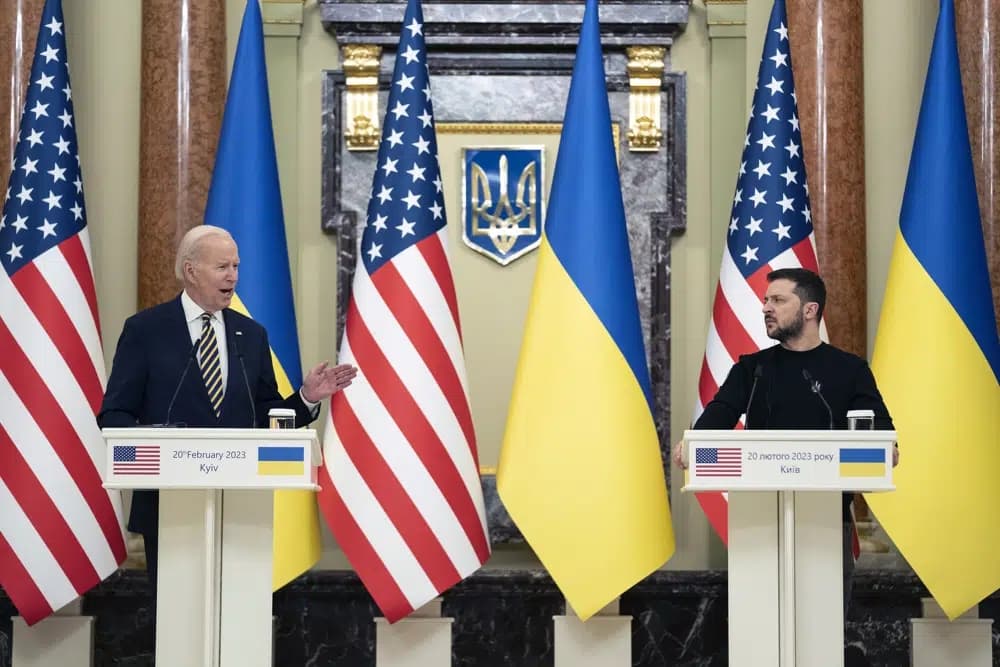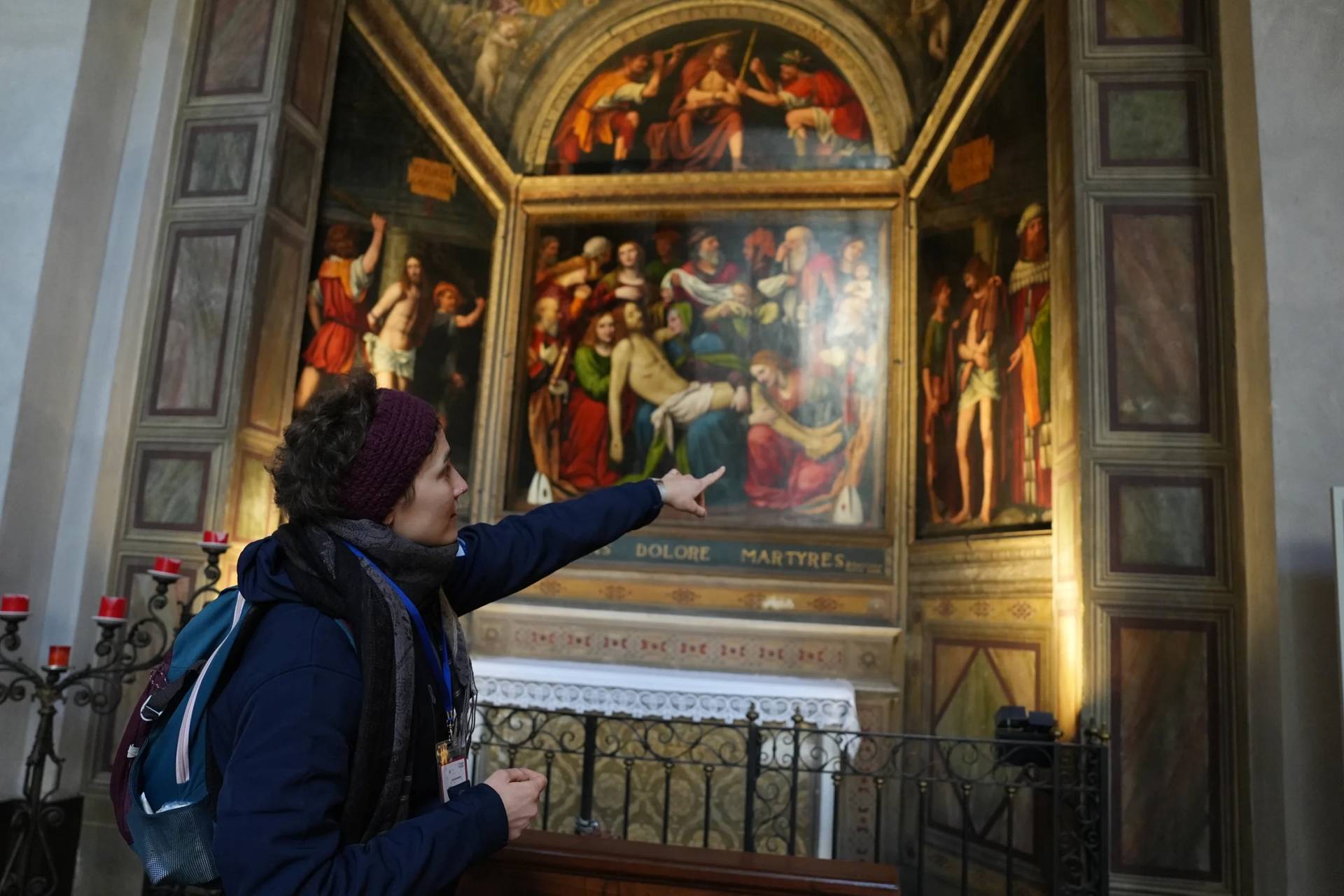ROME – Ukraine’s top Catholic prelate says the surprise visit of US President Joe Biden on Monday has given the country’s people new hope on the one-year anniversary of Russia’s invasion.
Speaking via Zoom with a handful of Italian journalists, Major Archbishop Sviatoslav Shevchuk, head of the Ukrainian Greek Catholic Church, said “the Russian army has literally sentenced us to death,” but that the many visits of heads of state to Kyiv in the past year, including that of Joe Biden, “gives us hope that this sentence will not be carried out.”
The solidarity shown by these visits, Shevchuk said, gives the Ukrainian people hope “that we will be able not only to survive but also to defend ourselves and build a free and democratic society.”
“A year ago, at this very moment, all diplomatic representatives were leaving Kyiv. The Americans themselves called on their fellow citizens to leave Ukrainian territory,” Shevchuk said, noting that when Russia invaded Ukraine on Feb. 24, 2022, only two diplomatic representatives remained in Kyiv: The Vatican’s envoy, Archbishop Visvaldas Kulbokas, and the ambassador of Poland.
“All the others fled. A year later, not only has everyone returned, but the president of the United States has even arrived,” Shevchuk said, issuing a plea to the international community: “Don’t leave us alone, don’t abandon us.”
With the war already reaching the one-year mark, it has lost much of its immediate news appeal, he said, voicing hope that “the Lord hears the voice of blood crying out from the Ukrainian land to the heavens” and that “the world not close its eyes before the wounds and suffering of the Ukrainian people.”
“We hope that they cry of our people will not be forgotten and that those who listen to us will not remain indifferent, because we have experienced that lies and indifference truly kill, indeed, they lead to genocide,” he said.
Biden made an unannounced visit to the Ukrainian capital of Kyiv Monday, where he met with Ukrainian President Volodymyr Zelenskyy in a display of western solidarity with the warring nation.
During the more than five hours he spent in Kyiv, Biden made several stops, consulting with Zelenskyy on potential next moves, paying homage to fallen soldiers, and visiting staff at the US embassy.
In a public address, Biden said Ukraine is still fighting “a brutal and unjust war,” but noted defiantly that despite Russia’s invasion last year and its continued offensive, “one year later, Kyiv stands. Ukraine stands. Democracy stands. The Americans stand with you, and the world stands with you.”
The United States has been one of Ukraine’s biggest supporters throughout the war, having given more than $3.75 billion in military assistance to Ukraine and other countries impacted by the ongoing war, with fighting expected to intensify soon with fresh spring offensives.
Zelenskyy has pressed allies to expedite the delivery of military weapons and has asked the West to provide fighter jets, a request Biden so far has declined. Zelenskyy has also asked for battlefield systems allowing its army to strike Russian targets that have withdrawn from the frontline.
While in Kyiv, Biden also announced an additional half-billion dollars in US support to Ukraine, to be used for the purchase of shells for howitzers, anti-tank missiles, air surveillance radars, and other forms of aid, but no new advanced weaponry was included.
“I thought it was critical that there not be any doubt, none whatsoever, about U.S. support for Ukraine in the war,” Biden said of his visit, saying, “The cost that Ukraine has had to bear has been extraordinarily high. And the sacrifices have been far too great, (but) Putin’s war of conquest is failing.”
When Russia initially invaded last year, many thought it would only be a matter of days, or weeks at the most, until Kyiv fell, yet Ukrainians proved incredibly resilient, and a year later, the capital remains firmly in Ukrainian control, despite ongoing shell and missile attacks.
This is due not only to the determination of the Ukrainian army, but also military defense support that Ukraine has received from its international allies.
Whether or not it is appropriate to provide weapons to Ukraine has been a subject of moral debate within the Catholic Church.
Pope Francis himself said on his return flight from Kazakhstan in September that arming Ukraine is “a political decision,” which can be moral under the right conditions, and that “To defend oneself is not only a right, but it’s also an act of love for the homeland.”
However, he said that providing weapons is immoral if it is done “with the intention to provoke further war or sell arms.”
In his remarks Monday, which were published on Italian news site SIR, the official news outlet of the Italian bishops’ conference, Shevchuk also weighed in on the point, saying the use of weapons in itself “demonstrates the impotence of modern society in preventing and stopping a war.”
Shevchuk said he tried to warn various people and institutions in late 2021 that war was likely to break out, “but unfortunately, neither the mechanisms of international law nor the negotiating dialogue itself have been able to prevent this tragedy.”
“The whole world today feels helpless in the face of this blind, absurd and sacrilegious war,” he said, saying Russia’s use of bombs and other weapons is currently “much higher” than the “intensity of fire” Ukrainians are responding with.
“Ukraine’s ability to defend itself is still not proportionate to the amount and ability of Russians to attack us,” he said, saying it is for this reason that the Pan-Ukrainian Council of Churches has deemed it “morally acceptable” to send weapons to Ukraine “to increase self-defense capability.”
“These weapons are for defense, not advance,” he said.
Shevchuk also praised the role the church has played in the conflict both in providing for the spiritual needs of the people, and in providing frontline aid, noting that in Kharkiv, one of hardest hit cities, food and other aid is distributed to people in front of the Greek Catholic Cathedral on a daily basis.
“Each of our parishes has become a center of social service. I am proud of my bishops and priests, monks and nuns,” he said, but noted that many “feel demoralized by the endless funerals of civilian and military victims they celebrate.”
To this end, he offered prayers for two priests – Father Ivan Levytskyi and Father Bohdan Heleta – who were arrested last November in Berdyansk, and remain in Russian custody, as well as a priest and a nun who were injured while delivering humanitarian aid near Kharkiv.
Yet despite moments of discouragement, the church “is a small light of hope. This Christian solidarity, this love, and this total entrustment to the Lord give us the possibility of hoping,” he said.
Follow Elise Ann Allen on Twitter: @eliseannallen













